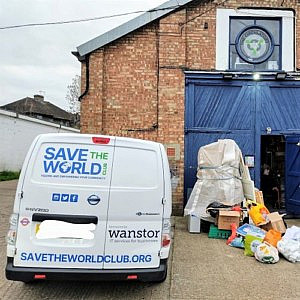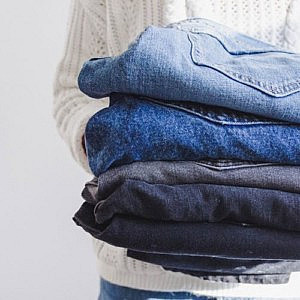10 ways to donate your decluttered items that you may not have thought of!
With the usual avenues for donating decluttered things either closed or restricted, we've had to get creative and work a little harder at clearing out our clutter. In this post we look at interesting solutions from our APDO members for the more unusual items they've come across and the unexpected destinations they've discovered for their clients' cast offs. Perhaps there is something here that already exists in your local area and would benefit from your Spring clearing clear out.Donate to animal welfare
Many of us love to support animal welfare and Marie Bateson of Cut the Clutter is no exception. She takes any towels, dressing gowns, fleeces and sweatshirts to Chorley Hedgehog Rescue. Your local animal rescue centre, zoo or pet shop might have specific needs during the pandemic. However, it is best to check with them directly and find out the best way to support the animals in their care. When Longleat Safari Park made a Christmas appeal for bedding for their chipmunk family., Amanda Terry of An Organised You seized the opportunity and donated a huge bag of client socks. The campaign was hugely successful, the park keepers were overwhelmed with donations so they're no longer collecting, but one-off requests like this can be a fabulous opportunity for quickly clearing out of specific items in your home.
Repairing, re-using and borrowing
In Bath, Carole Reed of Happy Sort loves her local Share and Repair organisation. They run workshops manned by volunteers who mend broken items for free. You can also donate unwanted items to their 'Library of Things' which can then be hired out. The library has items such as power tools, camping equipment and event supplies. It's very affordable to hire and they are always looking for more stock. Library of Things - Bath Share and Repair. There are similar organisations can all round the country. Men's Sheds are also a great place to donate all those bits in garages and sheds that you keep hold of, says Louise Simpson of Louise Simpson Coaching. 'Things like old clocks, tools and lawnmowers will be fixed and sold on to raise vital funds to keep the charity going'. Louise also suggests contacting your local children's outdoor play or wilderness place. The one near her takes anything from bits of wood, kitchen utensils (broken or usable), bowls and much more to use for outdoor creative play.Donate to people in need
In Surrey, Lynda Wylie of Tidy Rooms has been excited to discover the Save the World Club on her doorstep. It is a local charity which collects anything that can be redistributed to local people via their warehouse called The Circulatory. Keen to keep stuff out of landfill, they have an army of volunteers repairing bicycles, tools and electrical equipment for redistribution amongst local people. They even collect food from local supermarkets for families in need. The volunteers are very creative, even filling empty shipping containers to send to people in need in Uganda or creating art installations to highlight waste issues. [caption id="attachment_17099" align="alignnone" width="300"] The Save The World Club in Surrey[/caption]
Mel Carruthers of More Organised agrees with Lynda. Mel is a Trustee of her local refugee action charity Massive Outpouring of Love, (MOOL). MOOL collect clothing, camping equipment and luggage for refugees and asylum seekers in France, Greece and the Middle East, as well as clothing, furniture and household goods to support families in Scotland. Many towns and cities across the country have similar organisations, or you can check the Care 4 Calais map for your nearest drop off point.
The Save The World Club in Surrey[/caption]
Mel Carruthers of More Organised agrees with Lynda. Mel is a Trustee of her local refugee action charity Massive Outpouring of Love, (MOOL). MOOL collect clothing, camping equipment and luggage for refugees and asylum seekers in France, Greece and the Middle East, as well as clothing, furniture and household goods to support families in Scotland. Many towns and cities across the country have similar organisations, or you can check the Care 4 Calais map for your nearest drop off point.
Donate clothing
Clothing is one of the largest categories that we declutter. Anne Welsh of Tidy Beginnings is interested in what happens to our clothing and textiles once we donate them. "The most sustainable way to donate clothing is to give them to clothing banks", Anne explains. "I.e. those that collect clothes to be distributed to those in need, and where they will actually be reworn - as opposed to being sold as rags and pulped". To find your nearest clothes bank (and other recycling facilities), Anne recommends checking out www.recyclenow.com, where you enter your postcode for a list of options in your community. Furs are often difficult to dispose of. Sue Spencer from A Life More Organised once came across a full fox stole (complete with head and feet) whilst working with a client. "Luckily the client had prewarned me that we'd find it somewhere" says Sue. "We discussed several ways to pass this on to someone who would really love to own it. My client wasn't interested in getting any money from selling it, so it was donated to the costume section of a local amateur dramatic society. We knew that they would look after it well and make use of it in their productions".
Solutions for paper
For your paper waste, Esme Fisher of Tidy Coaching recommends First Mile, an environmentally-conscious recycling and shredding company which is keen to keep all waste out of landfill. "If you are decluttering your papers and need a secure shredding service, you can sign up for shredding bags to be sent to your door" says Esme. "Fill them up with your confidential papers and they will be collected for free from your door by DBS-checked operatives (in low emission vehicles) and taken to the First Mile secure industrial shredder". And finally, The Great Diary Project is a wonderful initiative accepting diaries from 'ordinary' people at the Bishopsgate Institute in London. Anne explains, "There's a simple deposit form to complete but it's straightforward and the institute is a great final resting place for family diaries". Hopefully this article has given you some ideas of places that you could donate your own decluttered items to, or similar organisations and projects in your own community. It's always a good idea to contact them first to check what they need and can accept. And for more tips on how to declutter during lockdown, our recent post "Making clutter count: Decluttering during the pandemic" is packed full of advice from APDO experts!If you're ready to have a Spring clear out but not sure what to do with your items, maybe there's a local initiative you could support or a national organisation ready to accept your donation. Your local Professional Organiser will be able to support you with your decision making and can be found at www.apdo.co.uk.
